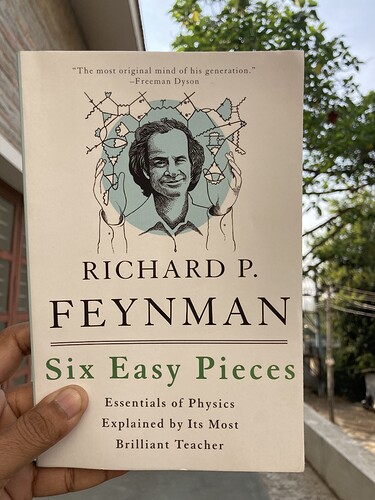Six Easy Pieces, Richard Feynman, 1963 - These six lectures are a part of Feynman’s Lectures on Physics delivered between 1961 and 1963 - The choice of these isn’t arbitrary and is perhaps based on accessibility. Before buying the 3 volume edition of his lectures, I wanted to sample it and this book was a perfect way to do the same.
The lectures cover atoms in motion (intuitively understanding gases, pressure, temperature, chemical reactions from properties of atoms) , basic physics (a lay of the land from past to present, from classical to quantum physics, understanding electricity and magnetism, sub-atomic particles and mass), relation of physics to other sciences (in other words, how Feynman makes chemistry, biology, astrology, geology, psychology as just higher abstractions of physics), conservation of energy (has some of the best thought experiments that Feynman was famous for), theory of gravitation (Kepler’s laws, Newton’s laws, gravity in the universe between stars, galaxies and a fantastic discourse on how the gravitational constant could be related to the age of the universe and then bringing in Einstein’s modification of Newton’s laws of gravity to be consistent with speed of light and theory of relativity) and the final chapter on quantum behavior (beautiful chapter covering waves and particles using experiments with bullets vs ripples of water and how light behaves and all the strangeness and closing with the uncertainty principle).
I liked how openly Feynman agrees on the several things we don’t know - like how gravity works (we know how it behaves but not the why and how) and also how he grapples at scale of things to understand intuitively how big an atom is, or how big a nucleus is within an atom or how much open space is there in each atom or in a drop of water or a crystal lattice using real world objects for reference like apple or earth. I never really grasped the size differential of sub-atomic things until I read this book. He is also very open about the fallibility of science (very Karl Popper in his approach with “What’s true is merely awaiting falsification”) and his own humbleness and fallibility as well in the Preface of the book where he thinks his lectures were a failure. For the love of science, read this book - its short, engaging and fun. 10/10

